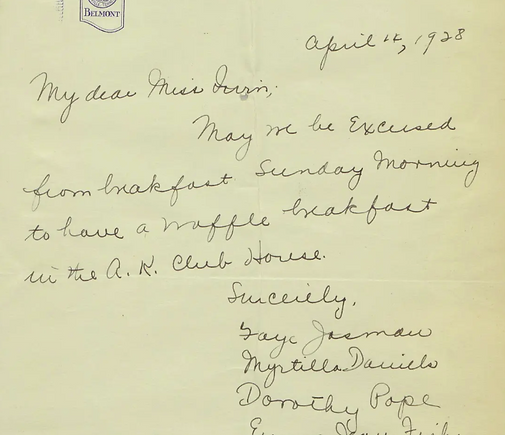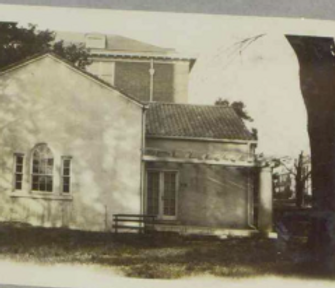A.K. Club at Ward-Belmont

Igler's membership in this social club on campus furthered her development in social networking. She participated in many social functions organized by the club, and developed essential leadership skills which would serve her in her legal career.
(Scrapbook, Elizabeth Igler, ca. 1927-1928, Courtesy of Belmont University Special Collections, Nashville, TN.)
Many of the social clubs at Ward-Belmont were referred to in text primarily by their acronyms (i.e. "A.K. Club instead of All 'Round Klub). The discovery of the A.K. Club's more formal name containing the spelling of "Club" with a "K" rather than a "C" is curious. Further research into the origin of this spelling choice brings us to this article in the Ward-Belmont Hyphen, a student newspaper at the school. The edition below was published on March 15th, 1938, ten years after Igler's graduation from Ward-Belmont, and contains an explanation by a student, Jeanne Frazee, of the origins of each social clubs' names at the campus. Most interesting is that the A.K. Club was not the only social club to spell "Klub" in this way. The other club to do so, the "Tri-K Club," has the full-name "Kubla Khan Klub."
Frazee offers the explanation that the "Tri K Club's name, Kubla Khan Klub, was taken from a wise old Mongolian ruler who was known for his good citizenship" (Frazee). This explanation only feeds the speculation of race being a factor in the naming process of these social clubs. The name's likeness to the Ku Klux Klan, commonly shortened to KKK (Tri-K), is striking, whether a coincidence or intentionally racializing. The selection of a "wise old Mongolian ruler... known for good citizenship" as the namesake for a young women's student social club seems to be a lose connection, and furthers the cause for consideration of racism possibly being embedded into the framing of these clubs.

"'Social Clubs' Names Originate From Many Interesting Sources'
By Jeanne Frazee
During the basketball season the clubs wire the center of most of our interest. Who was playing who, and who would win? As some of us tried yelling for the different clubs, we wondered where on earth they could have gotten those peculiar tongue-twisting names. As I paged through the club section of last year's annual to find the answer to my wonderings, I found that the club names came from all sorts of sources: some from the original number in the club, some from the ideals of the club, and others from the names of famous places. The X. L. Club received its name from the Roman numeral for forty, as this was the original number in the club. The F. F. Club is named for its first group called the "Friendly Fifty." Penta Tau got its name Penta because it is number five of the club houses and Tau from the first letters of its slogan: Think, Act, Use. The Anti-Pan's disdain to follow the impetuous maid Pandora. They declare themselves Anti-Pandoras; thus their club is named from their ideal to restrain all malicious thoughts and evil spirits and seek out the good. The Del Vers Club delves into everything. They try to satisfy their intellectual curiosity shown by their name. The Triad Club is named for its threefold purpose—social, civil, athletic. The Eccowasin Club gets its name from the Indian word meaning to "do all and give all." The Osiron Club's name is a combination of the words which make up the ideals of the club: Originality, Sincerity, Interest, Right, Objective, Nobleness. The name of the Ariston Club is taken from the Greek word Ariston, the singular of Aristos, the superlative of the word meaning good. -The A. K. Club received its name from the idea of the All-Round Klub. The T. C.'s got their name because they are the ultra-modern club—they are the Twentieth Century Club, the Tri K Club's name, Kubla Khan Klub, was taken from a wise old Mongolian ruler who was known for his good citizenship. The Agora's take their name from the Agora, a market place of ancient Greek cities, which was also a place of discussion. The Angkor's received their name from the famous temple of Angkor in India. Thus, there was a purpose and there is a meaning be- hind these seemingly strange club names."





